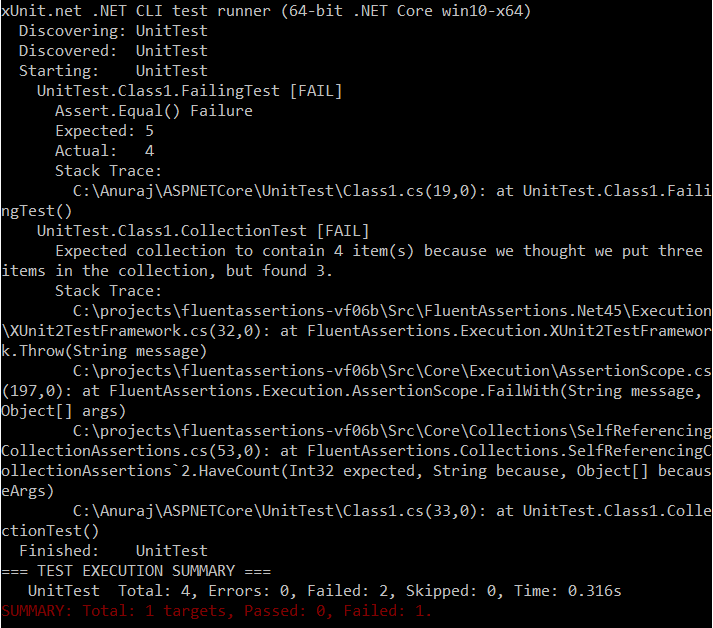Using FluentAssertions in dotnet core unit tests
December 01, 2016 by Anuraj
dotnet core FluentAssertions xUnit
This post is about using FluentAssertions in xUnit unit tests. Fluent Assertions is a set of .NET extension methods that allow you to more naturally specify the expected outcome of a TDD or BDD-style test. It has better support for exceptions and some other features that improves readability and makes it easier to write unit tests. In this post I am using ASPNET Yo man generator to create unit tests. And I have added FluentAssertions reference via project.json file.
Here is the project.json file.
{
"version": "1.0.0-*",
"testRunner": "xunit",
"dependencies": {
"dotnet-test-xunit": "2.2.0-preview2-build1029",
"xunit": "2.2.0-beta2-build3300",
"FluentAssertions" : "4.17.0"
},
"frameworks": {
"netcoreapp1.0": {
"dependencies": {
"Microsoft.NETCore.App": {
"type": "platform",
"version": "1.0.1"
}
}
}
},
"buildOptions": {
"copyToOutput": {
"include": [ "xunit.runner.json" ]
}
},
"tooling": {
"defaultNamespace": "UnitTest"
}
}Now in the unit test code, I have added two more unit test from FluentAssertions home page.
[Fact]
public void StringTest()
{
string actual = "ABCDEFGHI";
actual.Should().StartWith("AB").And.EndWith("HI").And.Contain("EF").And.HaveLength(9);
}
[Fact]
public void CollectionTest()
{
var collection = new[] { 1, 2, 3 };
collection.Should().HaveCount(4, "because we thought we put three items in the collection");
}The first test is to verify that a string begins, ends and contains a particular phrase. And the second one is to verify that a collection contains a specified number of elements and that all elements match a predicate.
Now you can do a dotnet restore command to restore the dependencies and run the unit tests with dotnet test command. And here is the results.

Happy Programming :)
Found this useful? Share it with your network!
Copyright © 2026 Anuraj. Blog content licensed under the Creative Commons CC BY 2.5 | Unless otherwise stated or granted, code samples licensed under the MIT license. This is a personal blog. The opinions expressed here represent my own and not those of my employer. Powered by Jekyll. Hosted with ❤ by GitHub
